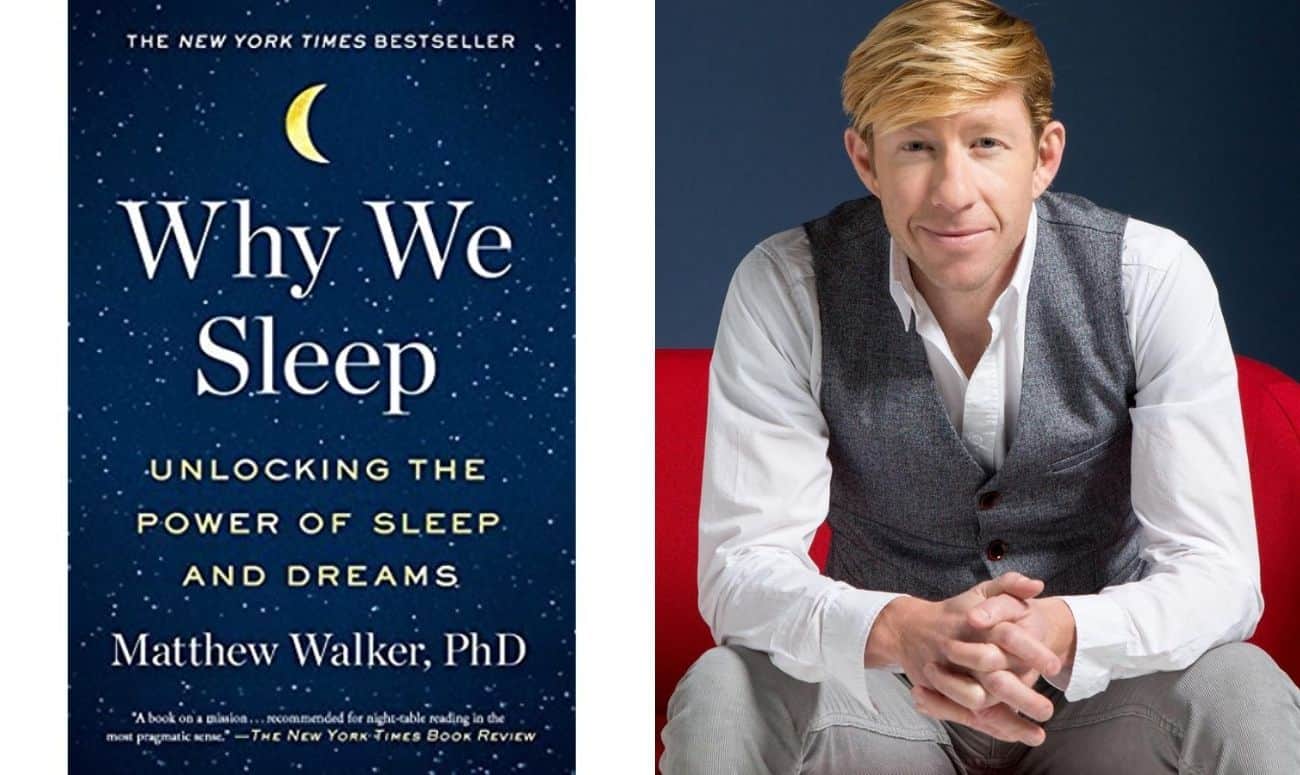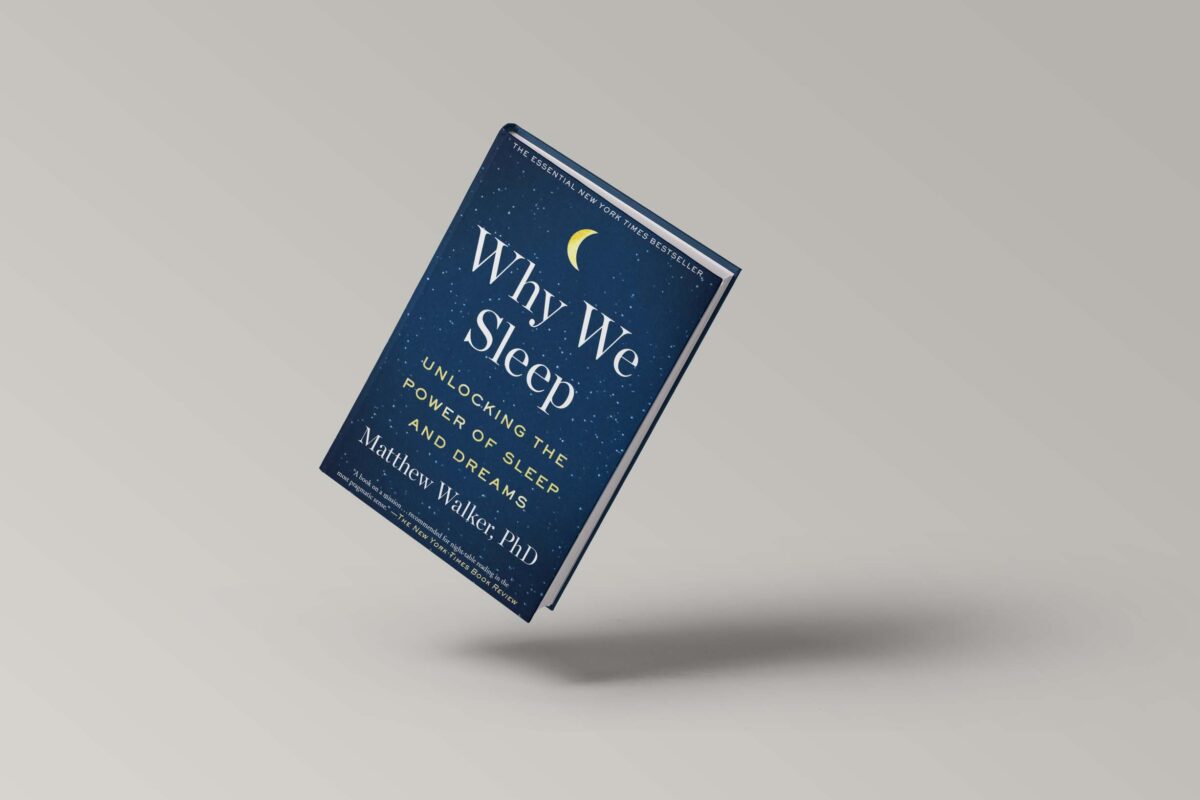The book Why We Sleep by Matthew Walker, PhD, offers a deep dive into one of the most essential yet frequently neglected aspects of our lives: sleep. Published in 2017, the book rapidly gained attention, becoming a must-read for anyone interested in health, well-being, and understanding the mechanisms of sleep. Matthew Walker, a renowned sleep scientist, brings years of research and study to help people appreciate the importance of sleep and how it impacts every facet of our lives, from cognitive function to physical health, creativity, and even longevity.
The book doesn’t just focus on the biological mechanisms of sleep; it explains, in layman’s terms, why sleep is critical for optimal brain function, emotional regulation, and even societal productivity. Walker bridges the gap between complicated neuroscience and everyday life, making it accessible to the general public, while also highlighting the dire consequences of chronic sleep deprivation.
More than just a scientific text, Why We Sleep is a call to action. It asks us to reevaluate how we approach sleep in our personal lives and as a society. It stresses that sleep is not just an optional activity but a biological necessity, much like food and water, that our bodies cannot do without.
Table of Contents
About the Author Matthew Walker, PhD

Matthew Walker is a professor of neuroscience and psychology at the University of California, Berkeley, where he also serves as the director of the Center for Human Sleep Science. With a PhD from the Medical Research Council of London and postdoctoral work at Harvard Medical School, Walker has become one of the leading voices in the field of sleep research. Over the course of his career, he has published more than 100 scientific research studies on sleep and its critical role in health and well-being.
Walker’s expertise is widely sought after, and he has been featured in various media outlets, including the BBC, National Geographic, and TED. His popular TED Talk on sleep has garnered millions of views, further cementing his role as an advocate for sleep health.
His mission is not just academic; it’s about educating the public on the devastating effects of sleep deprivation and advocating for societal changes that allow for healthier sleep habits. Walker argues that many of the modern world’s biggest health crises, from cardiovascular disease to Alzheimer’s, can be linked back to poor sleep habits. In Why We Sleep, he brings this information to the forefront in a way that is not only educational but also practical, offering readers tangible advice on how to improve their sleep and, consequently, their lives.
The Importance of Sleep

One of the most compelling arguments in Why We Sleep is that sleep is not merely a restorative process but a fundamental component of our biological architecture. Walker states that sleep affects nearly every aspect of our well-being, from our ability to think clearly to how well our bodies function. The relationship between sleep and health is profound, influencing everything from mental acuity and emotional stability to immune function and metabolic health.
Walker points out that the modern world often treats sleep as a secondary concern, something we can cut back on when life gets busy. However, he argues that the opposite should be true—sleep is the foundation upon which all other aspects of health are built. For instance, sleep regulates the release of hormones that control hunger, stress, and mood, and it plays a crucial role in cognitive processes such as learning and memory consolidation. Without sufficient sleep, these systems break down, leading to a cascade of negative health effects.
Some of the book’s key themes include:
- Sleep and the brain: Walker delves into how sleep enhances cognitive performance, improves memory retention, and boosts creativity.
- Sleep and physical health: Chronic sleep deprivation is linked to conditions such as heart disease, obesity, diabetes, and even cancer. Walker illustrates how sleep helps regulate the body’s metabolism, repair tissues, and maintain cardiovascular health.
- REM vs. non-REM sleep: Each stage of sleep serves a different function. While non-REM sleep helps the body repair and recuperate, REM sleep is essential for processing emotions, enhancing problem-solving abilities, and fostering creativity.
- The dangers of sleep deprivation: Walker explains how a lack of sleep impairs mental and physical functions, increases the risk of accidents, and contributes to the development of mood disorders like anxiety and depression.
Summary of Key Content

Part 1: Why Do We Sleep?
Walker begins by addressing a fundamental question: why do we sleep? Sleep has long been viewed as a necessary but somewhat mysterious part of life. While we all know we need to sleep, many people don’t fully understand why sleep is so essential to human health and survival.
Walker explains that sleep is not just a time when the brain and body shut down; rather, it is an active and dynamic process. During sleep, the brain undergoes critical restorative processes, including the clearing of toxins, the consolidation of memories, and the recalibration of neural networks. Sleep is also when our bodies repair damaged cells, regulate hormones, and strengthen the immune system.
The book covers the evolutionary history of sleep, describing how it has been conserved across different species for millions of years. Even animals as diverse as birds and reptiles have sleep cycles, demonstrating its importance to life. According to Walker, sleep plays a vital role in survival because it enhances brain function, improves decision-making, and enables problem-solving, which are all essential for survival.
Walker also explores the two major types of sleep: non-REM sleep and REM sleep. Non-REM sleep consists of four stages, ranging from light to deep sleep, where the body focuses on physical restoration. REM sleep, often called “dream sleep,” is when most of our dreaming occurs and is crucial for emotional regulation and cognitive flexibility.
Additionally, Walker introduces readers to the concept of the circadian rhythm, the body’s internal clock that regulates sleep-wake cycles. The circadian rhythm is influenced by external factors such as light and temperature but is primarily governed by the brain’s suprachiasmatic nucleus. Walker discusses how disruptions to this natural rhythm, such as those caused by artificial lighting or shift work, can lead to significant health problems.
Part 2: The Effects of Sleep on Health
This section delves deeply into the relationship between sleep and physical health. Walker makes the compelling case that sleep is perhaps the single most important factor in maintaining good health. Chronic sleep deprivation is linked to a range of serious health conditions, including cardiovascular disease, cancer, diabetes, and obesity.
One of the book’s key arguments is that sleep deprivation compromises the immune system, making the body more susceptible to infections and illnesses. Walker explains that during sleep, particularly deep non-REM sleep, the body produces cytokines, proteins that help fight off infections and inflammation. Without sufficient sleep, the body’s ability to produce these immune-boosting proteins is diminished, leaving it vulnerable to diseases.
Walker also discusses the role of sleep in metabolic regulation. Lack of sleep alters the balance of hormones that control hunger and appetite, leading to overeating and weight gain. This is partly because sleep deprivation increases the production of ghrelin (the “hunger hormone”) while decreasing the production of leptin (the hormone that signals satiety). As a result, people who are sleep-deprived tend to crave high-calorie foods, contributing to the obesity epidemic.
Another crucial point Walker makes is the connection between sleep and heart health. He cites studies showing that insufficient sleep leads to increased blood pressure, higher levels of stress hormones, and greater risk of cardiovascular disease. Sleep also plays a key role in regulating blood sugar levels, which is why sleep deprivation is strongly associated with the development of type 2 diabetes.
Moreover, Walker explains that sleep is essential for mental health. Sleep deprivation is a major risk factor for mood disorders such as anxiety and depression. REM sleep, in particular, helps process emotions and reduce stress. When we don’t get enough REM sleep, our brains become less capable of regulating mood, which can lead to emotional instability and mental health issues.
Part 3: Sleep and Mental Performance
In this section, Walker emphasizes the profound impact sleep has on cognitive function and mental performance. Sleep is essential for memory consolidation, learning, creativity, and problem-solving.
Walker explains that while we sleep, our brains are actively working to process and store information we’ve learned during the day. This is particularly true during REM sleep, when the brain consolidates memories and integrates new information with existing knowledge. Without sufficient REM sleep, our ability to learn and retain information is severely compromised.
Studies have shown that students who get adequate sleep perform better on exams and are more likely to retain information over the long term. Sleep also enhances creativity by allowing the brain to make connections between seemingly unrelated ideas. Many of history’s greatest inventors and artists have credited their creative breakthroughs to insights that came to them in dreams.
Walker also explores the role of sleep in decision-making and problem-solving. Sleep-deprived individuals are more likely to make impulsive decisions, exhibit poor judgment, and struggle with complex problem-solving tasks. This is because sleep is essential for maintaining the prefrontal cortex, the part of the brain responsible for executive functions such as planning, decision-making, and self-control.
The book also covers the impact of sleep on emotional regulation. When we are sleep-deprived, our brains become more reactive to negative stimuli, making us more prone to anger, frustration, and anxiety. REM sleep helps us process and regulate our emotions, enabling us to cope with stress and maintain emotional balance.
Part 4: How to Sleep Better
One of the most practical sections of the book offers advice on how to improve sleep quality. Walker provides evidence-based tips on how to create an optimal sleep environment and establish healthy sleep habits.
He recommends keeping the bedroom cool, dark, and quiet, as these conditions are conducive to falling and staying asleep. Walker also advises maintaining a consistent sleep schedule, going to bed, and waking up at the same time each day, even on weekends. This helps regulate the circadian rhythm and ensures better sleep quality.
Walker emphasizes the importance of reducing exposure to artificial light, especially blue light emitted by electronic devices such as smartphones and computers. Blue light suppresses the production of melatonin, a hormone that helps regulate the sleep-wake cycle. To mitigate the effects of blue light, Walker suggests avoiding electronic devices for at least an hour before bedtime and using “night mode” settings on devices to reduce blue light emissions.
In addition to environmental factors, Walker highlights the importance of lifestyle choices in promoting better sleep. He advises avoiding caffeine and alcohol in the hours leading up to bedtime, as both substances can interfere with the sleep cycle. Caffeine, in particular, has a half-life of around six hours, meaning that even a late afternoon cup of coffee can disrupt sleep. Alcohol, while it may help induce sleep initially, interferes with REM sleep and can lead to fragmented, lower-quality sleep.
Regular exercise is another crucial factor in promoting good sleep. Walker recommends engaging in physical activity during the day but warns against exercising too close to bedtime, as this can raise body temperature and make it harder to fall asleep.
Part 5: Sleep in the Modern World
In the modern world, sleep is often sacrificed in the name of productivity. Walker argues that this trend is not only detrimental to individual health but also has broader societal consequences. The widespread use of technology, long work hours, and constant connectivity have all contributed to a global sleep crisis.
One of the key issues Walker addresses is the impact of artificial lighting on sleep. Before the advent of electric light, humans were more in tune with the natural day-night cycle, rising with the sun and sleeping when it set. However, the proliferation of artificial lighting has disrupted this natural rhythm, leading to later bedtimes and shorter sleep durations.
Walker also explores the effects of shift work, which requires employees to work during nighttime hours and sleep during the day. This inversion of the natural sleep-wake cycle has been shown to increase the risk of numerous health problems, including obesity, heart disease, and cancer. Walker advocates for policies that reduce the number of night shifts and provide better accommodations for shift workers to protect their health.
Another modern challenge to sleep is the pervasive use of technology. Smartphones, tablets, and laptops have become fixtures in daily life, but they are also major disruptors of sleep. Walker points out that the constant barrage of information and notifications from these devices keeps the brain in a state of heightened alertness, making it difficult to relax and wind down before bed.
Part 6: Sleep and Public Health
Walker takes the discussion beyond the individual, exploring the societal and economic consequences of sleep deprivation. He argues that sleep deprivation is a public health crisis that affects not only individuals but also businesses, governments, and economies.
One of the most concerning consequences of sleep deprivation is its impact on safety. Sleep-deprived individuals are more prone to accidents, both at work and on the road. Walker cites statistics showing that drowsy driving is responsible for thousands of accidents and fatalities each year. The cognitive impairment caused by sleep deprivation is comparable to that caused by alcohol, yet sleep-deprived driving is often overlooked as a public safety concern.
Sleep deprivation also has significant economic costs. Studies have shown that sleep-deprived workers are less productive, more prone to errors, and more likely to take sick days. The cumulative effect of lost productivity due to sleep deprivation costs economies billions of dollars each year. In the U.S. alone, the economic impact of sleep deprivation is estimated to exceed $400 billion annually.
Walker calls for a cultural shift in how we approach sleep. He argues that employers, governments, and healthcare systems need to recognize the importance of sleep and implement policies that promote healthy sleep habits. This includes more flexible work hours, education on the importance of sleep, and interventions for individuals suffering from sleep disorders.
Part 7: Review and Reflection
Matthew Walker’s Why We Sleep is a comprehensive and compelling exploration of the science of sleep. It is both a scientific text and a practical guide, offering readers a wealth of information on why sleep matters and how to improve it.
One of the book’s greatest strengths is Walker’s ability to present complex scientific concepts in an accessible and engaging manner. He blends cutting-edge research with personal anecdotes and real-world examples, making the book both informative and enjoyable to read.
However, some readers may find certain sections of the book to be overly technical, particularly when Walker delves into the neuroscience of sleep. While these sections are crucial for understanding the mechanisms of sleep, they may be challenging for readers without a background in biology or neuroscience.
Despite this, Why We Sleep is an invaluable resource for anyone interested in improving their health and well-being. Walker’s message is clear: sleep is not a luxury, but a necessity. It is the foundation upon which our physical, mental, and emotional health is built. By prioritizing sleep, we can enhance every aspect of our lives, from our cognitive performance to our emotional resilience.
Conclusion

Why We Sleep by Matthew Walker is an essential read for anyone looking to understand the vital role sleep plays in human health and well-being. Walker’s research provides compelling evidence that sleep is the key to a healthier, happier, and more productive life.
In today’s fast-paced, technology-driven world, sleep is often seen as expendable. However, Walker’s book makes it clear that this mindset is not only wrong but dangerous. Sleep deprivation has far-reaching consequences, affecting everything from personal health to public safety and economic productivity.
If you are struggling with sleep or simply want to learn more about how to optimize your sleep for better health, Why We Sleep is the perfect place to start. It offers practical advice backed by scientific research and provides a roadmap for making sleep a priority in your life.
By understanding the importance of sleep and taking steps to improve it, you can unlock a wealth of benefits that will enhance every aspect of your life. From better mental clarity to improved physical health, the power of sleep is undeniable. As Walker reminds us, sleep is not just a passive activity—it is a fundamental pillar of health that we cannot afford to ignore.
